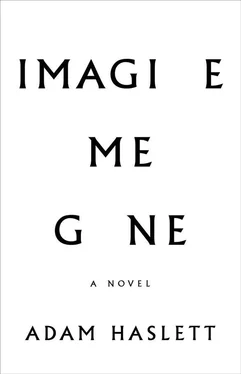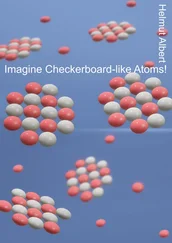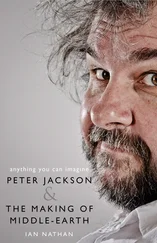Adam Haslett
Imagine Me Gone
Perhaps all music, even the newest, is not so much something discovered as something that re-emerges from where it lay buried in the memory, inaudible as a melody cut in a disc of flesh.
— Jean Genet
As I stepped out of the cabin, whiteness blinded me. The snow-covered yard glistened under the full sun. Icicles lining the roof of the shed dripped with meltwater. The fir trees, which had stood motionless and black against the gray sky, appeared alive again, green and moist in the fresh light. The footprints that Michael and I had made on the snowy path were dissolving, fading into ovals on the flagstone. Beneath our tracks in the driveway I could see gravel for the first time since we’d arrived. For weeks it had been frigid cold, but now had come this December thaw. I wasn’t certain what day it was, or what time, only that it had to be well after noon already.
Across the road stood the young lobsterman’s truck. Brown water seeped from the icy muck caked to its undercarriage. The red tarp covering his woodpile showed through a dome of melting snow. Up the slope, on the roof of his little white Cape, smoke rose from the chimney into the sheer blue.
I had to call my sister. I had to tell her what had happened. Hours had passed already, and still I had spoken to no one.
I began walking toward the village. Past the summer cottages closed up for the season, and the houses of the old retired couples with their porches glassed in and their lights on all day behind chintz curtains. In the deep cold this walk had been silent. But now I could hear the brook as it ran down through the woods, and under the road, emptying onto the rocky beach. I could hear the squawk of gulls, and even the trickle of water at the foot of the snowbanks, each rivulet wiping clean a streak of dried salt on the pavement.
I wanted to hear Seth’s voice. I wanted to hear him describe his day, or simply what he had eaten for breakfast, and tell me about the plans he was making for the two of us for when I returned. Then I could say to him that it would be all right now, that we could be together without interruption. But I hadn’t been able to bring myself to call him, either.
As soon as I spoke, it would be true.
I walked on, my coat unzipped, no hat or gloves, almost warm in the sun. My sister would be up by now out in San Francisco, riding the Muni to her office, or already there. My mother would be running errands or meeting a friend for lunch, or just out walking in this fine weather, imagining and worrying over Michael and me up here in Maine, wondering how long she should wait before calling us again.
At the intersection with the main road that led down into the village, I came to the old Baptist church. The high rectangles of stained glass along its nave were lit up red and orange, as if from within. Its white clapboard steeple was almost painful to look at against the brilliance of the sky. I wondered if the lobsterman and his wife came here. Or if he had come here as a child with his father, or his grandfather, or whether he went to church at all.
The sound that he’d made, chopping firewood in his driveway, it had grated on Michael. The slow rhythm of the splitting. It had brought Michael up off the couch, to the dining room window, to watch and mutter his curses.
Why couldn’t that sound do that again? I thought, in the waking dream of the moment, the unreal state of being still the only one who knew. Why couldn’t that sound summon Michael once more? Needle him, scrape at his ears. Why not? What kind of a person would I be if I didn’t at least try to call him back?
I turned around and started walking fast in the direction I had come, along the strip of road that dipped to the shoreline, up the little rise onto the higher ground, driven by the chance to begin the day over.
At first I thought my mind must be tricking me as I made the turn and saw the lobsterman — he was only a couple of years younger than I was — coming down his front yard in his Carhartt jacket and ball cap. I started jogging toward him, thinking he would disappear if I didn’t make it to him in time. But instead he halted a few yards short of his driveway, and watched me approach his truck. When I reached it I rested a hand against the tailgate, steadying myself.
In the month we had been here, neither Michael nor I had spoken a word to him.
We stood there a moment, facing each other. His arms hung straight down at his sides. His bearded face was strangely still.
“Can I help you?” he asked in a slow, wary tone that made of the question a species of threat.
I gestured with my head, toward the cabin. “I’ve been staying over there.”
“Yeah,” he said. “I’ve seen you two.”
Come nearer, I wanted to say. I needed him close enough to hit. Or to fall into his arms.
“Something’s happened,” I said, aloud, for the first time. “It’s my brother.”
Closer. Please come closer. But he didn’t, he stood his ground, squinting, uncertain of himself and of me.
Hello. You’ve reached the voice mail of Dr. Walter Benjamin. I am currently out of the office. If you are one of my patients, please leave your name, a very brief message, and your telephone number, even if you think I already have it, as it may not be handy. I will return your call as soon as possible. Please note that I am out of the office on Fridays, Saturdays, Sundays, Mondays, Tuesdays, Wednesdays, and Thursdays, and that any messages left on those days will be returned on the following Monday.
If this is an emergency, and you have gone on holiday by accident with your younger brother, in the hope that you might finally tear your eyes away from the scenes you have been fixedly contemplating your entire life, but find instead that a storm blowing in from paradise has become caught in your wings, so that all you can see is the wreckage of the past piling up before you, one single catastrophe, with no future, then please hang up, and contact my answering service.
Finally, if this is about a refill for a medication you require in order to survive, and you have some concern that your request may not reach me in time, and it seems likely that the words you are about to speak into this machine will be your last, then please know that you tried very hard indeed, and that you loved your family as deeply as you could.
We’re bound to forget something in the rush. I could pack only so much yesterday with taking Alec to the doctor to get his stitches out, Kelsey to the vet, and stocking up for the trip. But I did all I could, and at least John helped Alec and Celia pick out their books when he got home from work last night. Come hell or high water, we leave at eight thirty sharp. John drums it into the children. He turns it, like everything he does with them, into a game: You’ll be left behind if you’re a minute late and we won’t come back for you! When he parades through the house and calls out, Time to go, they’ll grab what’s at hand, assuming I’ve got the rest, and race for the car to compete over the backseat and the bucket seats, Michael and Celia opening another front in their roving war, Alec running behind toward another defeat at their hands. If he’s not included he’ll whine to quash their fun. Departures speed all their wants and fears, this one most of all: summer vacation, two weeks up on the water in Maine, in a borrowed house.
The babysitter has agreed again to feed the rabbits, the guinea pig, the bird, and even Michael’s snake, which requires her to dangle defrosted mice on the end of a stick. Of the menagerie, only Kelsey comes with us, most unruly of all, and object of the children’s keenest ridicule and devotion. Their untrained mutt of a mascot, who plows through window screens and shits on beds, though I still love her through their eyes.
Читать дальше












